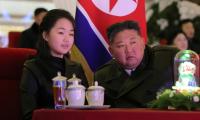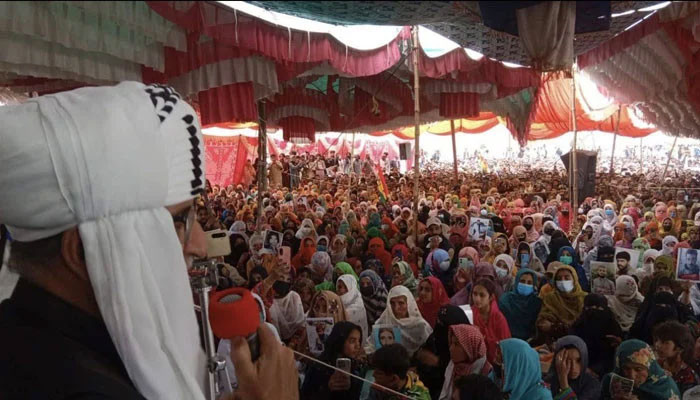No end in sight
BNP-M chief Akhtar Mengal states party would now take its campaign to district-level rallies across province
The Balochistan National Party-Mengal (BNP-M) on Wednesday announced an end to its 20-day sit-in protest at Lak Pass, Mastung. BNP-M chief Akhtar Mengal stated that the party would now take its campaign to district-level rallies across the province. The protest was sparked by the arrests of Baloch rights activists, including Dr Mahrang Baloch, chief organiser of the Baloch Yakjehti Committee (BYC), and other detained female activists. Mengal explained that the decision to call off the sit-in was made in view of the public hardship it was causing. Key highways linking Quetta with Karachi and Taftan had been shut down, leading to severe economic disruption and critical shortages of essential goods. The Quetta-Karachi highway has now been reopened. Authorities also prevented Mengal’s planned long march from entering Quetta.
Earlier this week, the BNP-M convened an All Parties Conference (APC), which called for the implementation of constitutional guarantees associated with the 1948 Instrument of Accession, through which Balochistan joined Pakistan. The APC also urged a national-level dialogue to address longstanding grievances. It rejected recent decisions of the National Security Committee (NSC), warning that such approaches would only deepen unrest. Participants emphasised the need to abandon repressive measures and instead uphold constitutional principles to address Balochistan’s legitimate concerns and reduce political uncertainty. The situation in Balochistan remains grim. From terrorist attacks to political unrest, the province has seen little peace. On Tuesday, a bomb planted on a motorcycle targeted a bus carrying 40 policemen in Mastung, killing at least three personnel of the Balochistan Constabulary and injuring several others. The Islamic State (IS) group claimed responsibility. From the hijacking of the Jaffar Express to attacks by the Baloch Liberation Army (BLA), from the killing of Punjabi labourers to a recent suicide bombing at the BNP-M sit-in, the violence appears unending.
In response, the army chief has vowed to confront terrorists with unprecedented force. He spoke extensively about Balochistan at a recent convention, echoing the message of the prime minister: those who seek to destabilise Pakistan will be dealt with an iron fist. There is no doubt that terrorism must be eradicated from the restive province. But there is also no doubt that the long-term solution to Balochistan’s crisis is political. The BNP-M’s call at the APC for addressing genuine grievances is both timely and valid. The government must respond not only with development projects but with a much-needed political healing touch. Addressing the issue of missing persons, improving education and healthcare, and ensuring Balochistan receives its fair share of resources are essential steps. These are necessary to make the people of Balochistan feel they are equal stakeholders in the federation. The province is not a periphery, and the state must stop treating it as such. Veteran politicians like Mian Nawaz Sharif and President Asif Ali Zardari have a critical role to play. The 18th Amendment was a step in the right direction for addressing the grievances of smaller provinces – but much more needs to be done. Dialogue with mainstream Baloch nationalist leaders must be initiated. They are not terrorists, and should not be treated as such. They are the genuine political voices of the Baloch people. They must be heard – with an open mind. What Balochistan needs is healing, not more wounds.
-
 Claude Still Down? Latest Updates On Outage
Claude Still Down? Latest Updates On Outage -
 Watch: Nancy Guthrie's Suspect Break His Silence After Being Dubbed Masked Kidnapper
Watch: Nancy Guthrie's Suspect Break His Silence After Being Dubbed Masked Kidnapper -
 'Deadliest Catch' Star Dies In Tragic Incident At 25
'Deadliest Catch' Star Dies In Tragic Incident At 25 -
 Kawhi Leonard Earns All-NBA Praise From Zach Lowe After Clippers Turnaround
Kawhi Leonard Earns All-NBA Praise From Zach Lowe After Clippers Turnaround -
 Nuggets Vs Jazz: Jamal Murray’s 45 Points Power Denver Past Utah
Nuggets Vs Jazz: Jamal Murray’s 45 Points Power Denver Past Utah -
 Justin Timberlake Moves To Block Release Of Body Cam Footage From DWI Arrest
Justin Timberlake Moves To Block Release Of Body Cam Footage From DWI Arrest -
 Kim Jong Un’s Future Under Speculation: Could His Daughter Lead North Korea?
Kim Jong Un’s Future Under Speculation: Could His Daughter Lead North Korea? -
 Nancy Mace Under Investigation By House Ethics Panel For Alleged Overcharges
Nancy Mace Under Investigation By House Ethics Panel For Alleged Overcharges -
 'Sinners' Star Jayme Lawson Calls Out BAFTA Organisers For Exploiting Tourette's Advocate
'Sinners' Star Jayme Lawson Calls Out BAFTA Organisers For Exploiting Tourette's Advocate -
 Lauren Boebert Gets Yelled At By Hillary Clinton Over Leaked Photo During Epstein Deposition
Lauren Boebert Gets Yelled At By Hillary Clinton Over Leaked Photo During Epstein Deposition -
 Is It A Full Moon Tonight? NASA Says Blood Moon Will Light Up Canada
Is It A Full Moon Tonight? NASA Says Blood Moon Will Light Up Canada -
 Priyanka Chopra Reveals Why Her Late Dad Would Have 'loved' Nick Jonas
Priyanka Chopra Reveals Why Her Late Dad Would Have 'loved' Nick Jonas -
 US Embassy In Riyadh Hit By Drones As Fire Breaks Out In Diplomatic Quarter
US Embassy In Riyadh Hit By Drones As Fire Breaks Out In Diplomatic Quarter -
 Sean ‘Diddy’ Combs Set For Early Prison Release Amid Appeal
Sean ‘Diddy’ Combs Set For Early Prison Release Amid Appeal -
 Zendaya's Mom Breaks Silence Over Tom Holland Wedding Confession
Zendaya's Mom Breaks Silence Over Tom Holland Wedding Confession -
 Dax Shepard Set To Make Shocking Revelation About Childhood Sexual Abuse In New Memoir
Dax Shepard Set To Make Shocking Revelation About Childhood Sexual Abuse In New Memoir




